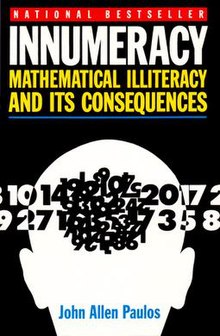 Hardcover of Innumeracy: Mathematical Illiteracy and its Consequences | |
| Author | John Allen Paulos |
|---|---|
| Subject | Mathematics and society |
| Publisher | Hill and Wang |
Publication date | 1988 |
| Pages | 135 |
| ISBN | 0-8090-7447-8 |
| Website | web |
Innumeracy: Mathematical Illiteracy and its Consequences is a 1988 book by mathematician John Allen Paulos about innumeracy (deficiency of numeracy) as the mathematical equivalent of illiteracy: incompetence with numbers rather than words. Innumeracy is a problem with many otherwise educated and knowledgeable people. While many people would be ashamed to admit they are illiterate, there is very little shame in admitting innumeracy by saying things like "I'm a people person, not a numbers person", or "I always hated math",[1]: 3–6 [2][3][4] but Paulos challenges whether that widespread cultural excusing of innumeracy is truly worthy of acceptability.[1]: 3–6
Paulos speaks mainly of the common misconceptions about, and inability to deal comfortably with, numbers, and the logic and meaning that they represent.[5]: 133, 213 He looks at real-world examples in stock scams, psychics, astrology, sports records, elections, sex discrimination, UFOs, insurance and law, lotteries, and drug testing.[1] Paulos discusses innumeracy with quirky anecdotes, scenarios, and facts, encouraging readers in the end to look at their world in a more quantitative way. The book sheds light on the link between innumeracy and pseudoscience. For example, the fortune telling psychic's few correct and general observations are remembered over the many incorrect guesses. He also stresses the problem between the actual number of occurrences of various risks and popular perceptions of those risks happening.[1] The problems of innumeracy come at a great cost to society.[6] Topics include probability and coincidence, innumeracy in pseudoscience, statistics, and trade-offs in society. For example, the danger of getting killed in a car accident is much greater than terrorism and this danger should be reflected in how we allocate our limited resources.
- ^ a b c d Paulos, John Allen (1988). Innumeracy: Mathematical Illiteracy and its Consequences. Hill and Wang. ISBN 0-8090-7447-8.
- ^ Green, Elizabeth (2014-07-14). "Why do Americans Stink in Math?". New York Times. Retrieved 30 August 2016.
- ^ Cundiff, Elizabeth (23 February 2016). "Innumeracy". Missouri S&t'S Peer to Peer. 1 (1). Retrieved 30 August 2016.
- ^ Richards, Carl (2014-08-04). "Americans are Bad at Math". New York Times. Retrieved 1 September 2016.
- ^ MacNeal, Edward (1994). Mathsemantics: Making Numbers Talk Sense. Penguin. ISBN 9780140234862.
- ^ Gina Donaldson, Jenny Field, Dave Harries, Clare, Tope, Helen Taylor (15 August 2013). Becoming a Primary Mathematics Specialist Teacher. Routledge. p. 22. ISBN 978-1136322167. Retrieved 1 September 2016.
{{cite book}}: CS1 maint: multiple names: authors list (link)